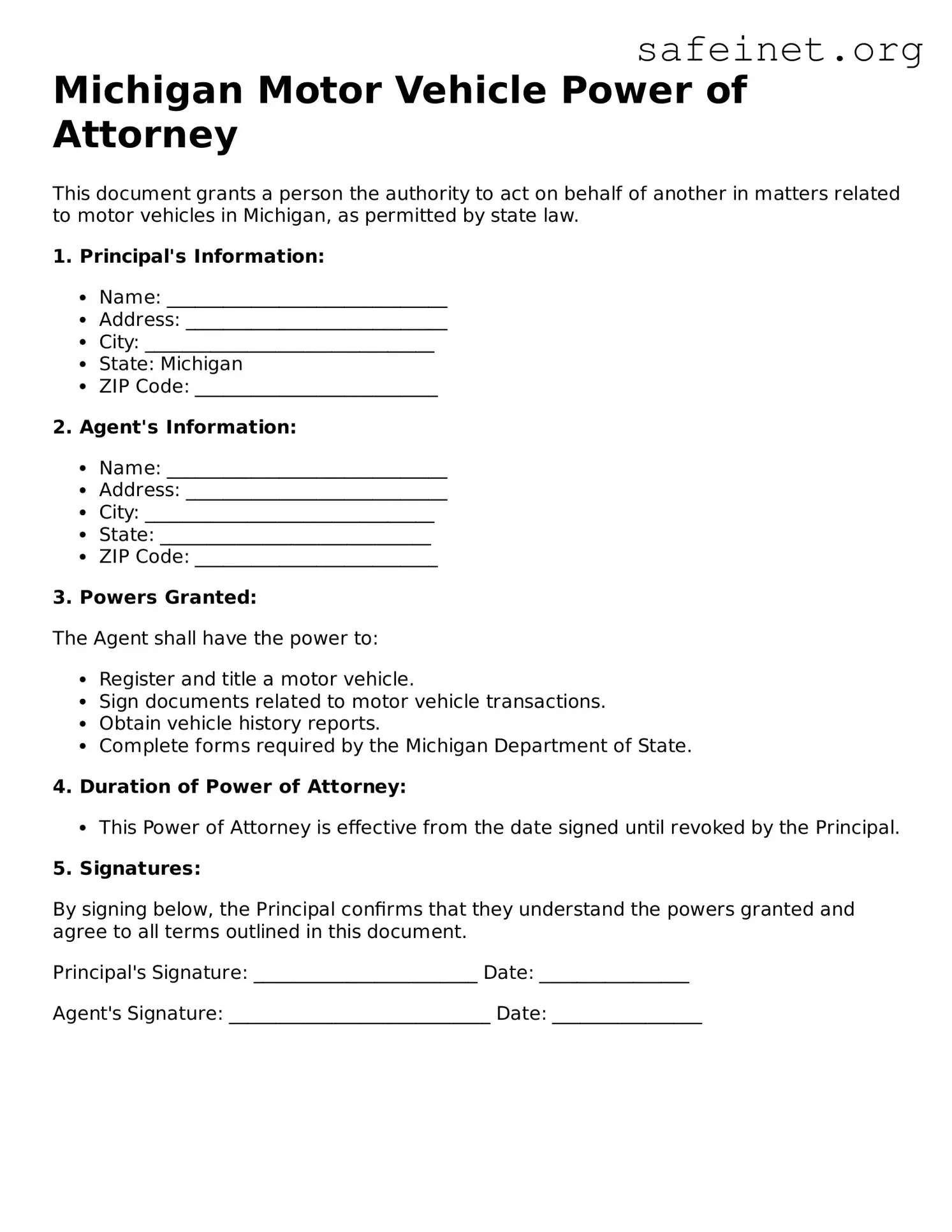The Michigan Motor Vehicle Power of Attorney form is similar to the General Power of Attorney. In both cases, individuals can grant someone else the authority to make decisions on their behalf. This authority can extend beyond just vehicle-related matters. For example, a general power of attorney can cover financial decisions, legal matters, and more. Like the motor vehicle version, the general form must be signed in a specific way that complies with state laws to be legally binding.
Another document that shares similarities is the Medical Power of Attorney. This form allows someone to make health care decisions for another person. While the focus is on medical issues rather than vehicles, both documents serve to appoint an agent who acts in the best interest of the grantor. In each case, clear communication is essential to ensure the agent understands the wishes of the person they represent.
The Durable Power of Attorney is also comparable. It remains effective even if the person who created it becomes incapacitated. This feature mirrors the Motor Vehicle Power of Attorney, which often includes the ability for the agent to act on behalf of the grantor in situations where they may be unable to act on their own. Both documents aim to ensure that important actions can be taken regardless of the circumstances surrounding the grantor.
A Special Power of Attorney is similar in that it grants specific powers under defined conditions. For instance, the motoring aspect of the Motor Vehicle Power of Attorney can be seen as a special power. In contrast to a general power of attorney, which covers broader issues, a special power of attorney is tailored to particular needs like vehicle registration, transfer of title, or handling other motor vehicle matters.
The Financial Power of Attorney shares parallels with the Motor Vehicle Power of Attorney. While one focuses on financial decisions, the other centers around vehicle transactions, both require a trusted individual to act on the person’s behalf. The conditions under which these powers can be used and the responsibilities of the agent remain paramount in both forms.
Similarly, the Revocable Living Trust can function in ways akin to the Motor Vehicle Power of Attorney, especially when it comes to asset management. A trust allows a person to place their assets—including vehicles—into a trust, with a designated trustee managing them. Like the power of attorney, this document provides clarity on who has the authority to use and manage those assets.
The Limited Power of Attorney is another document in this realm. This allows an agent to act only for specific tasks, such as dealing with a motor vehicle sale. This mirrors the Motor Vehicle Power of Attorney, where powers are often restricted to vehicle-related activities. The emphasis is on allowing someone to act as needed without overreaching into other areas of the individual’s life.
A Health Care Proxy is also comparable, as it designates a person to make health-related decisions. Like the Motor Vehicle Power of Attorney, it emphasizes trust. The individual must be confident that their chosen agent will represent their interests accurately and make choices that reflect their values and preferences.
The Living Will, while traditionally focused on end-of-life decisions, can also be loosely compared. It expresses a person’s wishes regarding medical treatment but doesn’t grant power to someone else. In contrast, the Motor Vehicle Power of Attorney does underlines the need for clarity and trust in appointing someone to act on your behalf, a common thread across these documents.
Lastly, a Business Power of Attorney mirrors the Motor Vehicle Power of Attorney in a business context. This form grants authority to someone to handle business-related matters, reflecting how the motor vehicle form allows handling vehicle transactions. These documents are vital for ensuring specific tasks are managed by trusted individuals, facilitating smoother operations whether in business or personal endeavors.
